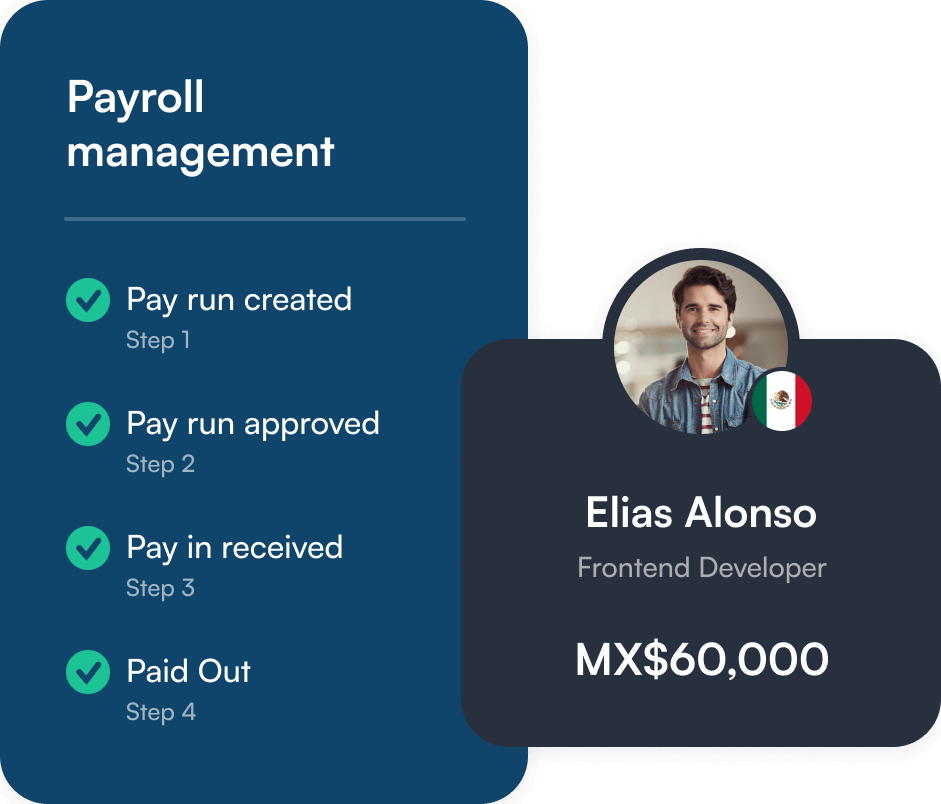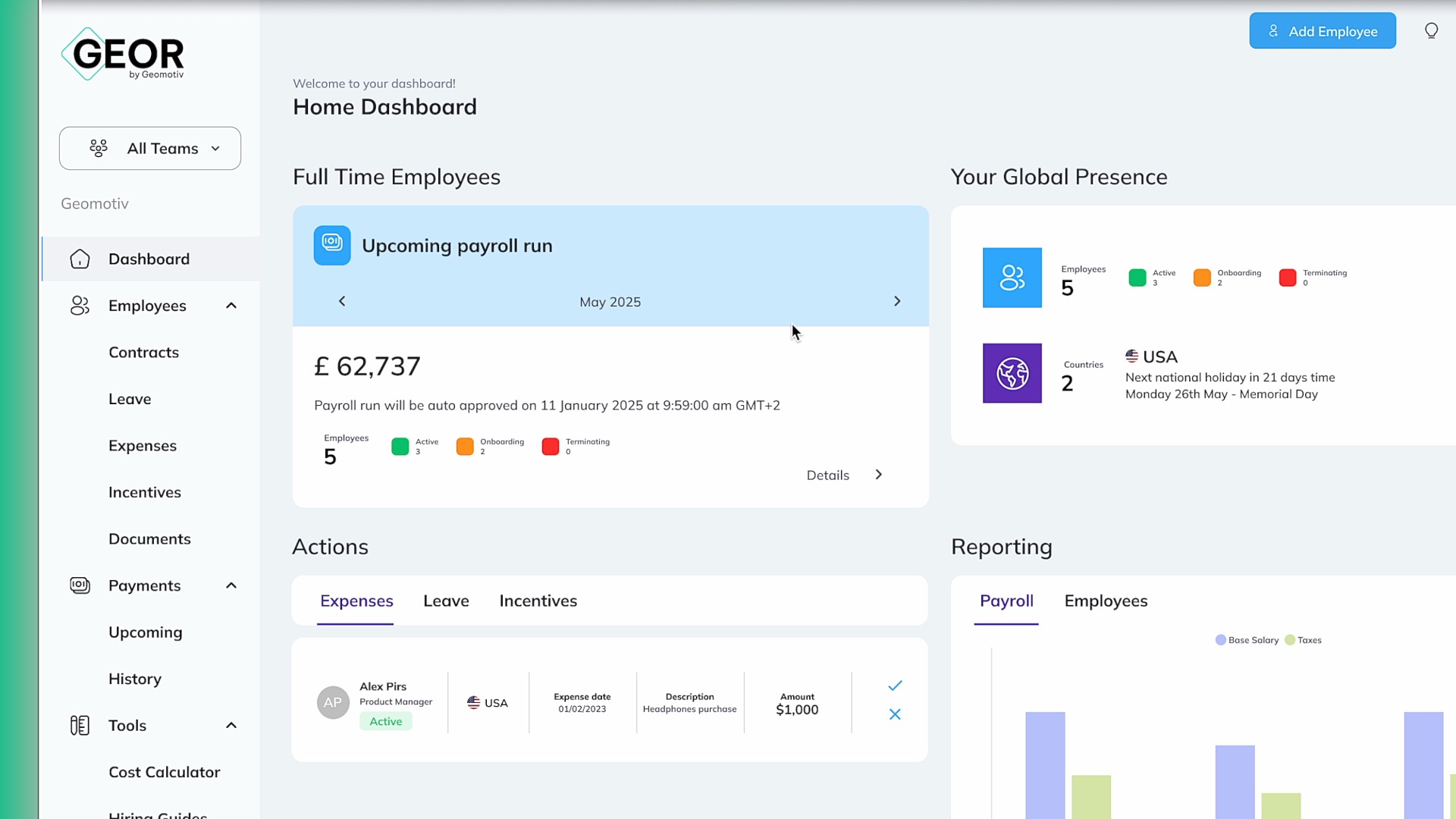- Onboard in one weekEngineers with contracts and filings in place.
- Payroll without guessworkWe run calculations, contributions, and reporting.
- Aligned with legal frameworkEnsuring national law and tech-sector standards.
- Integrated IP protectionYour code, data, and innovation stay secured.
- Benefits tech talent expectsPrivate healthcare, equity, and remote stipends.
- Agile hiring, clear termsAdd or reduce headcount with flexible terms.
Payroll services
in Mexico
Run payroll, tax, and benefits in Mexico without the local setup. Fully localized, legally aligned, and built for tech hiring.

Tech-backed scalable payroll in Mexico
Smart payroll with accurate deductions, legal alignment, and full support for Mexico hiring.

Mexico
MX$25.3 trillion
Spanish
MX$ (Mex$, $)
MX$480k–720k/year
Mexico payroll tax rates
ISR (income tax)
1.92%–35%, withheld by employer
IMSS (social security)
25–30%, employer-paid
INFONAVIT (housing fund)
around 5%, employer-paid
SAR (retirement savings)
2%, employer-paid
Need to pay your dev team in Mexico?
We manage it clearly and fast.
State payroll tax
Extra 1%–3%, varies by state and company type
Freelancer tax (self‑employed)
ISR and 16% VAT via CFDI
Reporting
Monthly CFDI and contributions filed to SAT.
Excerpts from Mexican labor law
Wage
Minimum: MX$248.93/day (2025); higher in border zones.
Overtime
2x for the first 9 extra hours/week, 3x beyond.
Payroll cycle
- Biweekly is standard
- Monthly permitted
Pay stub
CFDI de nómina in digital format.

Essential employee benefits
- IMSS covers health, pension, housing via employer contributions
- 12 days paid vacation minimum after one year, increasing with tenure
- 15-day aguinaldo and 10% profit sharing (PTU)
- 12 weeks maternity, 5 days paternity leave
- Private health, food vouchers, remote work support (optional)
Payroll framework
in Mexico
Every step of tech payroll needs to follow the law. That means knowing how payroll taxes in Mexico work, classifying roles correctly, and fulfilling social security service requirements.
Employees and self-employed professionals in Mexico
Correctly classifying employees and self-employed professionals is essential for companies operating in Mexico. Misclassification can lead to retroactive tax liabilities, penalties from SAT, and full employer obligations under IMSS.
- Statutory paid vacation and public holidays
- Social security through IMSS and SAR pension contributions
- Annual bonus (aguinaldo) and profit sharing (PTU)
- Paid parental leave, sick leave, and workplace protections
- Termination rights and severance if applicable
In Mexico, worker classification is regulated by SAT and IMSS. Companies must correctly distinguish between contractors and employees, especially when hiring remote specialists. Legal status depends on how the work is performed, not where the person lives.
Independent professionals may be treated as employees if:
- They follow schedules or routines set by the company
- They rely on internal tools or infrastructure
- Their work is approved or directed by in-house managers
- They depend financially on a single client
When these conditions are met, SAT or IMSS may reclassify the role. This creates retroactive obligations, including payroll filings, IMSS registration, and full employee benefits under Mexican labor law.
Even remote engineers, developers, or product contractors may be seen as employees if:
- They join team meetings or report to company leads
- They work through Slack, GitHub, or internal tools
- Their scope is reviewed or modified by managers
- They are paid monthly based on time or output
To avoid reclassification, make sure your contractor model reflects genuine autonomy.
Companies hiring remote or hybrid tech professionals in Mexico must meet labor, tax, and safety requirements—regardless of where the work is performed.
Right to work
Employees must be Mexican citizens or hold valid residency and a work permit. Foreign workers require sponsorship and must remain employed to maintain status.
Equipment and expenses
Under teletrabajo law, employers must cover proportional costs for electricity, internet, and necessary equipment. Terms must be specified in the employment contract.
Health and safety
Per NOM-037-STPS-2023, employers are responsible for ensuring safe conditions in remote environments. This includes ergonomic evaluations, hazard prevention, and access to occupational health support.
Data protection and cybersecurity
Workforce responsibilities include:
- Secure access to internal systems and client data
- Defined policies for remote tools and file storage
- Transparent consent handling under Mexico’s LFPDPPP law
Cross-border data handling
If remote employees access or store data across borders, companies must ensure safeguards under LFPDPPP and adhere to global standards where applicable (e.g., SCCs for U.S. SaaS tools).
Payroll implications
Remote or hybrid setups do not exempt companies from payroll filings, tax declarations (SAT), or IMSS contributions. All remote employees must be fully reported.
Equity can be part of a tech compensation strategy in Mexico, but it requires clear tax treatment and careful structuring. There are no EMI-style tax incentives available.
- Equity is taxed as regular salary income (ISR applies)
- Employers must contribute IMSS, INFONAVIT, and SAR on the equity’s value
- CFDI must reflect the equity value in the employee’s pay stub when triggered
Issuing a pay stub is mandatory under Mexican labor law. Employers must provide a CFDI de nómina—digitally signed XML and PDF—on or before each payday.
What a CFDI de nómina must include:
- Gross salary
- Net salary after ISR and deductions
- Breakdown of ISR, IMSS, INFONAVIT, and SAR contributions
- Pay period covered
- Bonuses and benefits (aguinaldo, PTU, allowances)
- Employer and employee tax IDs (RFCs)
Mexico follows national labor law, but employers must still account for regional taxes, remote work policies, and foreign hire procedures—especially when building cross-state teams or managing hybrid operations.
Key location-based and structural factors:
- State payroll taxes range from 1% to 3%, in addition to federal contributions.
- Profit sharing (PTU) calculations may differ slightly by sector or location.
- Some states require additional payroll filings or documentation.
- Hybrid and remote setups must follow NOM-037-STPS guidelines.
- Payroll rules for visa holders must reflect immigration-linked employer duties.
Most tech employers operate under national frameworks—but if your engineers span multiple states, or your company sponsors foreign talent, regional compliance becomes essential.
Mexico payroll and HR challenges
Mexico’s HR landscape requires more than automation. Payroll outsourcing in Mexico demands legal fluency, accurate contributions, and region-specific handling.
Wage structure alignment
Gaps between legal, local, and tech pay can raise red flags.
Worker classification risks
Misclassified contractors may trigger ISR debts and employment liabilities.
Pay stub compliance
CFDI must detail net pay, taxes, and follow SAT formatting.
Data protection risks
Software engineers must follow LFPDPPP for data, IP, and access security.
Social contribution complexity
Errors in IMSS and INFONAVIT filings delay pay stubs or cause audits.
Leave and bonus calculations
Track all paid leave, aguinaldo, and PTU with precision.
Remote work obligations
Teletrabajo requires cost reimbursement and ergonomic documentation under law.
Retention and reputation
Payroll mistakes hurt morale—tech teams expect clarity and accuracy.
Built for Mexico-managed teams
Unlike other payroll providers in Mexico, we speak tech and law fluently.

SAT registration, CFDI issuance, and all ISR, IMSS, and INFONAVIT procedures handled in one integrated monthly cycle.
Clear guidance on employee vs contractor status to minimize liability and stay within Mexican labor law boundaries.
From gross-to-net calculations to XML validation, filings, and digital pay stubs—processed through SAT-compliant systems.
Phantom shares, RSUs, and performance bonuses mapped into compliant payroll structures and cross-border reports.
Configurable health insurance, food vouchers, internet stipends, and other perks designed to attract and retain tech talent.
All payroll data is encrypted and stored in environments audited for LFPDPPP, SAT, and IMSS compliance.
Explore Our Payroll Platform
See how the Global Employer Of Record platform helps you seamlessly manage your global workforce — from hiring and compliance to payroll and employee requests — all in one place.

Outperforming payroll companies in Mexico
Most payroll services in Mexico offer surface-level coverage with limited tech sector focus. GEOR delivers strategic payroll outsourcing with deep expertise in Mexico payroll, achieving faster onboarding, lower costs, and stronger workforce retention.
transparent pricing
Our basic package is ideal for startups, growing businesses, and nearshore teams seeking to go beyond standard outsourcing.
- Onboarding within 7 days
- Payroll processing
- Pension, social fees, and reporting
per employee/ month.
No hidden fees or extra charges.
Your payroll no‑brainer in Mexico
Start paying your team as early as tomorrow.
See how simple it is to run compliant payroll with GEOR.

Client Feedback
Why companies switch to GEOR
Built for Mexico’s legal landscape and tech hiring realities. We combine local expertise with full payroll ownership to offer more than just a platform.
| Feature | GEOR | Paylocity | Multiplier |
|---|---|---|---|
| Local compliance | Mexico-based ops and legal team | U.S.-centric, limited Mexico coverage | Relies on partners, limited local depth |
| Payroll structure | CFDI-ready, full ISR/IMSS/INFONAVIT flow | Generalized global payroll solutions | Standardized global templates |
| Tech expertise | Built for software, product, and data teams | Broad industry focus | Broad industries, not tech-focused |
| Equity/bonuses | Includes phantom stock, PTU, and aguinaldo | Limited support for local equity schemes | Minimal support for equity structures |
| Support | Bilingual HR + SAT experts | U.S.-based support, limited local insight | Ticket-based, slower response |
Built for fast-moving engineering teams
Scale in Mexico with a provider that gets how engineering teams really operate. GEOR knows the pace of tech hiring, the pressure to retain top talent, and how much rides on getting every contract right. We deliver structure with intelligence, not burden.
Mexico payroll that just works.
Test the easy way.
FAQs
Employers must issue CFDI digital pay stubs and submit monthly payroll reports to SAT. Bonuses, benefits, and contributions are regulated under federal law.
We combine automation with bilingual HR and legal support to ensure accurate filings, proper classification, and full alignment with local requirements.
Yes. GEOR can act as your local Employer of Record, managing contracts, compensation, and government filings on your behalf.
Absolutely. We work with global employers to ensure their Mexico-based staff are fully compliant, even without setting up a legal entity.
We handle all calculations and filings for ISR (income tax), IMSS (social security), INFONAVIT (housing), SAR (retirement), and PTU (profit sharing).
Yes. We support phantom stock, RSUs, and performance-based bonuses, integrating them into CFDI and reporting them to SAT.
Yes. We structure remote work contracts, manage reimbursements, and stay aligned with NOM-037-STPS and labor regulations.
No. GEOR handles onboarding, salary payments, and employee benefits so you can operate without a local HR team.
Yes. Our infrastructure complies with LFPDPPP and SAT data protection standards, using encrypted systems and secure CFDI delivery.
Yes. We support both employment types, including CFDI invoicing and full ISR and IVA compliance for independent contractors.
We follow national labor rules to assess whether a worker qualifies as an employee or contractor, based on control, exclusivity, and dependency.
Freelancers must register with SAT, issue CFDI invoices, and handle their own taxes. We verify setups to reduce the risk of misclassification.
GEOR issues fully compliant CFDI de nómina (XML and PDF), delivered securely to each worker by or before the scheduled pay date.
GEOR specializes in LATAM payroll for software teams, offering fast onboarding, legal alignment, and contractor-friendly support tools.
Beyond payroll in Mexico
If you’re hiring beyond paychecks and looking to give your team more.
Отправляя данную форму вы подтверждаете свое согласие с Политикой конфиденциальности











